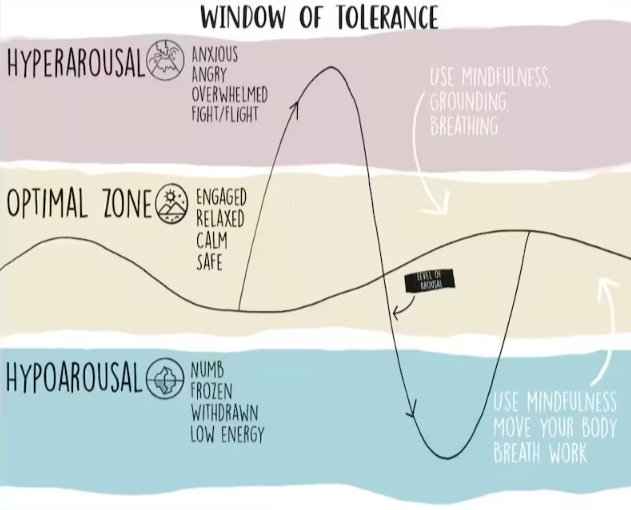How to not look away from intersectional equity
Many people are socialized by cultures of dominance where racism, ableism, ageism, sexism, transphobia, fatphobia, and our ignorance of these various systemic colonial oppressions enable the continued cycles of violence we encounter. Of course, looking at this violence isn’t easy either.
What waking up to systemic intersectional oppression might feel like in your body…
Early developmental trajectory when waking up to systemic oppression: can be shocking, triggering one of two traumatic reflexive responses:
Overwhelm and Hyper arousal, with emotions like grief, rage, and anxiety presenting. This can also look like over fixing and burning out or overtaking the process because the feeling of the injustices is intolerable in the body.
OR
Overwhelmed into Apathy and Numbness. One can become submissive, “walk on egg-shelly”, fearful and disconnected. Out of their power and their body.
In doing decolonizing work staying within our window of tolerance is a mindful/bodyful process important to staying with discomfort that can lead to growth and social bonding.
How can we be aware of these early developmental stages in ourselves? What is a trigger?
When we are “triggered” we are re-experiencing our initial trauma response. According to Dr Richard Schwartz, who developed the Internal Family Systems Model, the traumatized or wounded parts of ourselves tend to be younger and less emotionally nuanced. This means responding with extreme intensities. These extremes can immediately hijack a collective space.
If you feel emotional intensities building, SLOW DOWN - we live in a culture of urgency as default- but can take a moment to drop down into real connection with self and stay there for a minute continuing to RELATE AUTHENTICALLY and tolerate the feeling. Check in with your self-observing ego, aka that voice in your head/heart/vagus nerve/body. When might you be acting from traumatic reflexive responses instead of from your true self? For example, when might we be asking defense-based, fear-based, or shame-based questions? Instead of questions lead by empathy, curiosity, and love.
Defense-based, fear-based, or shame-based questions tend to emerge if we are confronted with one of out own implicit biases. Staying in curiosity means you acknowledge your implicit biases, or wake up to them, and accept that sometimes you can’t see the harmful ones. Switch gears from framing things as whether you are or are not something (racist, sexist, classist etc) because given many of us have been socialized within a neo-colonial culture, we may get further by asking empathic question like how might I possibly be causing harm with my actions? And am I being racially or otherwise problematic right now?
What are some grounding strategies when activated?
Crossing the midline: Crossing the midline of the body activates both sides of the brain and simple practices like self-hug, muscle level touch on either shoulder crossing your arms, or constant bear from Tai Chi are simple ways to cross the midline.
Rocking: Rocking is an early developmental movement usually experienced first with our mothers and can be quite soothing.
Tapping: Tapping with skin or muscle level intensity anywhere on the body to remind us we have a body and bring us back from dissociative states.
Interoception/body scanning: What is it that you’re feeling? Bring conscious awareness to that part of you and discern between sensation, temperature, emotion. Be tender to that part of yourself and ask how you can take care of it.
Breath work: Bringing attention to or deepening breath can work to slow the heart rate, but this can be more activating for some folx so please use this strategy with caution.
Shaking it out: Shaking helps to release some of the tension your muscles and emotional body are hanging on to. Shake it out in both small gestural or whole-body movements.
What is trauma-informed work?
We can work on dances in academic or performance spaces from a trauma-informed place. There is an important distinction between this and trauma-informed care which is where trauma-based approaches are implemented to purposefully heal trauma (as in dance/movement psychotherapy spaces). Keeping therapeutic and other contexts clear is an important element to creating cultures of consent so folx know the shared agreements of the space. In most educational contexts we aim to be self responsible for holding our activation alongside the collective agreements of the space.
If the aim of decolonizing conversations is healing, then recognizing the stages of trauma feels important. They are generally conceived in psychotherapy literature as four stages: Acknowledgement, Safety, Process, and Integration. I have a future post coming on the troubling legacies of Psychology as a field and acknowledging the tension when different ontologies or world views connect in a common goal towards healing. For now I highly recommend the work of Thomas Teo writing on Critical Psychology at York U, and the selected publications of Métis scholar Gus Hill at Wilfred Laurier University.
Whether we accept these four phases or not, in many traditions healing is not linear! So we may loop through developents at any given time in our healing journey. We also may need to search for more empathy as we encounter and engage with those who aren’t further along in their personal journey.
My personal belief, as learned from these words from Sioux Elder Black Elk, is that healing and journeys of empowerment usually happen in a circle:
If you found this post helpful, keep circling back here for future posts and thinking on how the body might support trauma-informed and consent-forward spaces nurturing bodily autonomy and agency in the arts.



